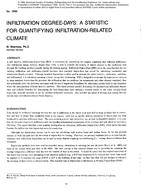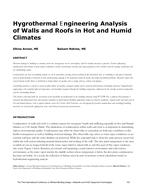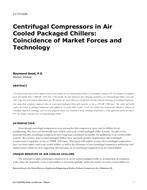The air distribution in and around a building with a complicated configuration is well simulated by the finite difference method based on generalized curvilinear coordinates. This paper follows preceding studies which were based on ordinary Cartesian coordinates (Murakami et al. 1987, 1988).
Numerical simulations of room airflow by the present method using the k-e model based on curvilinear coordinates are conducted. Its validity and feasibility for application to engineering problems are confirmed by comparing sirnulation results with the experimental results.
Citation: ASHRAE Transactions, vol. 95, pt. 2, Vancouver, BC 1989
Product Details
- Published:
- 1989
- Number of Pages:
- 38
- File Size:
- 1 file , 2.5 MB
- Product Code(s):
- D-27112


